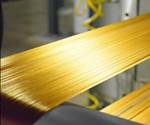4M Carbon Fiber to incorporate Carbonscreen AI monitoring system into plasma oxidation process
Letter of intent outlines steps to develop a real-time AL/ML monitor and control system to support automated, high-quality carbon fiber production.
Plasma oxidation line. Source | 4M Carbon Fiber
Carbon fiber manufacturer 4M Carbon Fiber (Knoxville, Tenn., U.S.) has executed a letter of intent (LOI) with (Aachen, Germany), a company of AI-driven fiber monitoring systems. This strategic collaboration aims to integrate AI technology into 4M’s plasma oxidation manufacturing process to achieve new levels of precision, efficiency and quality control in the company’s carbon fiber production.
The agreement outlines steps to develop an AI/machine learning (ML) monitor and control system for 4M’s plasma oxidation technology. These efforts will incorporate real-time fiber monitoring and intelligent reporting. 4M will have exclusive use of the resulting hardware and software AI system for plasma oxidation.
“This collaboration marks a significant step forward in our mission to revolutionize carbon fiber manufacturing,” said Truman Bonds, CTO of 4M Carbon Fiber. “By harnessing the power of AI, we can push the boundaries of efficiency, quality and scalability in plasma oxidation, ultimately making high-performance carbon fiber more accessible and cost-effective.”
Pending successful development and implementation, 4M anticipates incorporating Carboscreen’s AI monitoring systems into its plasma oxidation ovens as a value-added option for customers.
The partnership is subject to further development milestones and definitive agreements. Both companies are committed to advancing these initiatives with best efforts, ensuring a seamless integration of AI-driven automation into the carbon fiber manufacturing ecosystem.
Related Content
-
Infinite Composites: Type V tanks for space, hydrogen, automotive and more
After a decade of proving its linerless, weight-saving composite tanks with NASA and more than 30 aerospace companies, this CryoSphere pioneer is scaling for growth in commercial space and sustainable transportation on Earth.
-
Prepreg compression molding supports higher-rate propeller manufacturing
To meet increasing UAV market demands, Mejzlik Propellers has added a higher-rate compression molding line to its custom CFRP propeller capabilities.
-
Filament winding increases access to high-performance composite prostheses
Steptics industrializes production of CFRP prostheses, enabling hundreds of parts/day and 50% lower cost.






